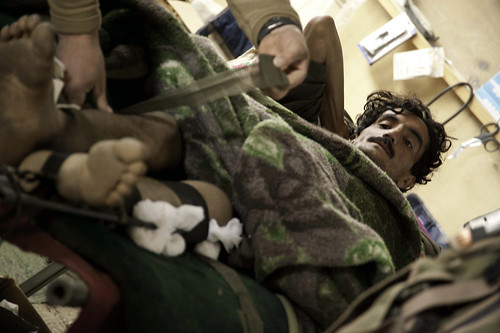
Afghan National Police help transport an injured citizen from eastern Kandahar Province's Maruf District to a hospital in Kandahar City, Afghanistan, Jan. 3, 2011. ISAFMedia
Writing in the Boston Globe, H.D.S. Greenway, has retrieved a charming historical factoid and applied it to current events:
He goes on to rehash the obvious: once immediate vengeance was achieved by sending bin Laden and Mullah Omar scampering for the hills, the U.S. has never quite known what its Afghan war aims might be. (Journalist Gareth Porter has argued persuasively that Afghanistan was used by some U.S. enthusiasts for NATO as an excuse for preserving that obsolete European alliance. This does seem like going far afield.)Following a catastrophic defeat during the first Afghan war 170 years ago, the British sent another army, calling it the “Army of Retribution.’’ We don’t label our war aims quite so frankly these days, but, in effect, that was America’s goal a decade ago: to inflict retribution on Al Qaeda and its enablers, the Taliban, in the wake of 9/11.
Not surprisingly, Afghans don't know why we are fighting them and occupying parts of their country either. According to a study by the International Council on Security and Development reported in the International Business Times,
Not too surprising that you can't sell your narrative if you can't figure out what it is yourself. The whole mess would be humorous if lives and livelihoods were not being destroyed every day it continues."Over 90 per cent of interviewees in the south are not familiar with the events of 9/11 which brought NATO-ISAF to Afghanistan," ... According to the report, almost 40 per cent of respondents believed that foreigners were in Afghanistan to destroy the country, to occupy Afghanistan, or to destroy Islam. More than 70 per cent of also view foreigners as disrespectful of their religion and traditions.
"65 per cent (of the respondents) believe that NATO-ISAF kills more civilians than the Taliban," it said.
ICOS maintained that at the grassroot level, the dissemination of the international community's political narrative and public justification for its presence in Afghanistan is very limited.
No comments:
Post a Comment